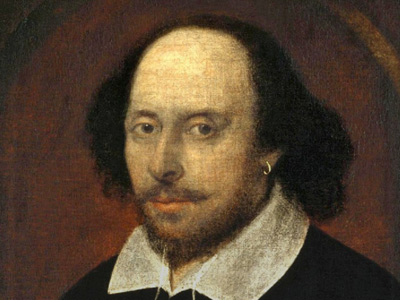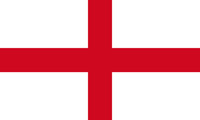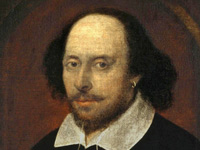William Shakespeare (1564-1616)

Early Life
William Shakespeare was the son of John Shakespeare, an alderman and a successful glover originally from Snitterfield, and Mary Arden, the daughter of an affluent landowning farmer. He was born in Stratford-upon-Avon and baptized there on 26 April 1564. His actual date of birth remains unknown, but is traditionally observed on 23 April, Saint George's Day. This date, which can be traced back to an 18th-century scholar's mistake, has proved appealing to biographers because Shakespeare died on 23 April 1616. He was the third child of eight and the eldest surviving son.
Although no attendance records for the period survive, most biographers agree that Shakespeare was probably educated at the King's New School in Stratford, a free school chartered in 1553, about a quarter-mile (400 m) from his home. Grammar schools varied in quality during the Elizabethan era, but grammar school curricula were largely similar: the basic Latin text was standardised by royal decree, and the school would have provided an intensive education in grammar based upon Latin classical authors.
At the age of 18, Shakespeare married 26-year-old Anne Hathaway. The consistory court of the Diocese of Worcester issued a marriage licence on 27 November 1582. The next day, two of Hathaway's neighbours posted bonds guaranteeing that no lawful claims impeded the marriage. The ceremony may have been arranged in some haste since the Worcester chancellor allowed the marriage banns to be read once instead of the usual three times, and six months after the marriage Anne gave birth to a daughter, Susanna, baptised 26 May 1583. Twins, son Hamnet and daughter Judith, followed almost two years later and were baptised 2 February 1585. Hamnet died of unknown causes at the age of 11 and was buried 11 August 1596.
After the birth of the twins, Shakespeare left few historical traces until he is mentioned as part of the London theatre scene in 1592. The exception is the appearance of his name in the "complaints bill" of a law case before the Queen's Bench court at Westminster dated Michaelmas Term 1588 and 9 October 1589. Scholars refer to the years between 1585 and 1592 as Shakespeare's "lost years". Biographers attempting to account for this period have reported many apocryphal stories. Nicholas Rowe, Shakespeare's first biographer, recounted a Stratford legend that Shakespeare fled the town for London to escape prosecution for deer poaching in the estate of local squire Thomas Lucy. Shakespeare is also supposed to have taken his revenge on Lucy by writing a scurrilous ballad about him. Another 18th-century story has Shakespeare starting his theatrical career minding the horses of theatre patrons in London England The Kingdom of England was a sovereign state on the island of Great Britain from about 927, when it emerged from various Anglo-Saxon kingdoms, until 1 May 1707, when it united with Scotland to form the Kingdom of Great Britain. The Viking invasions of the 9th century upset the balance of power between the English kingdoms, and native Anglo-Saxon life in general. The English lands were unified in the 10th century in a reconquest completed by King Æthelstan in 927.. John Aubrey reported that Shakespeare had been a country schoolmaster. Some 20th-century scholars have suggested that Shakespeare may have been employed as a schoolmaster by Alexander Hoghton of Lancashire, a Catholic landowner who named a certain "William Shakeshafte" in his will. Little evidence substantiates such stories other than hearsay collected after his death, and Shakeshafte was a common name in the Lancashire area.
The Kingdom of England was a sovereign state on the island of Great Britain from about 927, when it emerged from various Anglo-Saxon kingdoms, until 1 May 1707, when it united with Scotland to form the Kingdom of Great Britain. The Viking invasions of the 9th century upset the balance of power between the English kingdoms, and native Anglo-Saxon life in general. The English lands were unified in the 10th century in a reconquest completed by King Æthelstan in 927.. John Aubrey reported that Shakespeare had been a country schoolmaster. Some 20th-century scholars have suggested that Shakespeare may have been employed as a schoolmaster by Alexander Hoghton of Lancashire, a Catholic landowner who named a certain "William Shakeshafte" in his will. Little evidence substantiates such stories other than hearsay collected after his death, and Shakeshafte was a common name in the Lancashire area.
HISTORY

RESOURCES
This article uses material from the Wikipedia article "William Shakespeare (1564-1616)", which is released under the Creative Commons Attribution-Share-Alike License 3.0.
© Stories Preschool. All Rights Reserved.









